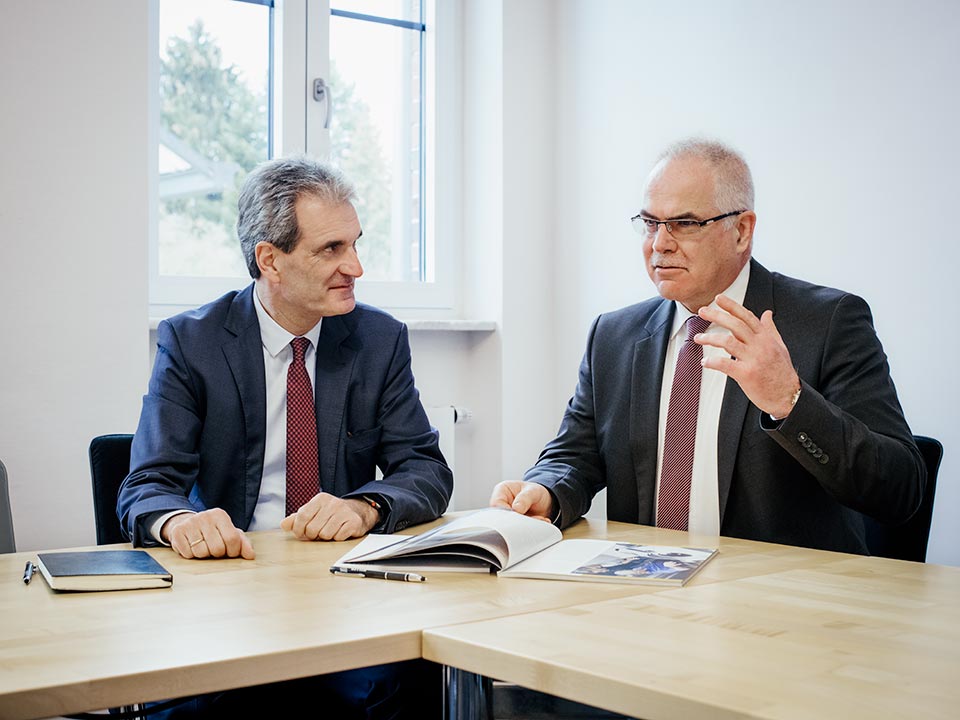At the same time, machine tools and also staff need to adapt to changing requirements in terms of Industry 4.0. How does HELLER respond to this development?
Maier: The boundaries between mechanics and electrics continue to dissolve. One result, for example, was the creation of the education and study programme in mechatronics. Today, a profound understanding of both areas is indispensable. At the same time, that does not make specialism redundant. After all, mechatronics engineers will sooner or later have to decide which area to focus on. What is important is to communicate with each other.
Winkler: Computer science is the third field that comes into play. However, the crucial factor for success is the team performance. And it is our task to promote exchange and team spirit.
Will all this have an impact on future machine concepts?
Maier: The mechanical design of machine tools – provided that a high chip removal rate and maximum precision are requirements – is subject to physical conditions which are not going to be fundamentally different from today’s standards in the future. Changes are to be expected in terms of the integrated sensors and actuators. As a result, the machine tool will increasingly develop into an integral part of superordinate systems.
How important is the Nürtingen location to the company?
Winkler: To this day, it remains very important. Nürtingen is still the largest individual location of the company. An enormous amount of knowledge is concentrated here. Nürtingen is a development site, but most importantly, it supports the global market units. At the same time, I am confident that the emphasis within the HELLER Group will shift in the medium term …
… in which direction?
Winkler: We will increasingly expand our workforce in those regions where our customers are located. Today, we generate 30 percent of our business in Germany, but 70 percent of our staff work here. I assume that it will be difficult in the long term to even achieve this 30 percent revenue share in Germany. Therefore, I believe that we need to expand our staff at other locations in the future. However, this is not going to have a negative effect on the Nürtingen location at all. Rather it will strengthen it. Past experience has shown that this is possible. Despite the increasing degree of internationalisation and the installation of production facilities in various regions around the world, staff numbers at Nürtingen have remained at the same level.
How high is the vertical range of manufacture at HELLER?
Maier: The electrical components through to the control are purchased parts, as are structural elements, such as bearings or guideways. For all other components, the following applies: “HELLER has the ability to manufacture everything in-house, but we do not have the capacities to do so.” It means that we also purchase specific manufacturing parts. However, we produce all components and assemblies affecting quality, such as the rotary tables and spindle units, ourselves. I would also like to mention that we have returned to producing specific parts in-house we used to purchase in the past.
By now, many competitors have incorporated additive processes into their machines. What about HELLER?
Maier: In principle, the coating of cylinder bores is an additive manufacturing process. This included, HELLER is by far the largest integrator of additive processes in the machine tool sector. This means that CBC has made us the global market leader in terms of additive manufacturing. Moreover, we will be able to use the experience gained with the CBC processes in other applications. To us, additive manufacturing is a supplement to our portfolio, nothing more. As said, HELLER’s core business is production. As a rule, it is impossible to manufacture high volumes using additive processes. Neither do they offer the precision we expect.
In what direction will HELLER develop in the coming years?
Winkler: Our objective is clearly to achieve further growth – on a global scale. To support this goal, we need to continue to expand our portfolio, develop new groups of customers whilst continuing to strengthen our relationship with the automotive industry.
Where do you see the markets of the future?
Winkler: Quite clearly in Asia and, despite the latest news, also and above all in China. Although China has meanwhile become the most important market for automobiles, the vehicle density in the country is nowhere near as high as in the US or in Europe. This means there is going to be a massive demand in the future. Moreover, it may be assumed that industrialisation is nowhere near sufficient to increase the standard of living, thus contributing to a stable political environment. This offers the international machine tool industry additional sales opportunities.
Maier: Based on the potential business volume, Asia will remain the absolute number one for many years in terms of machine tool consumption. As far as the US is concerned, I can say that, if we succeed in achieving a share in sectors outside the automotive industry there that is comparable to our share in Europe, then North America will be an important growth market for HELLER, too.
In early summer, HELLER will celebrate its 125th company anniversary. What activities are planned?
Winkler: The main event will be the Anniversary Day taking place at the beginning of July. At the event, we want to celebrate the anniversary with our staff and their families. For the public, a special exhibition is staged from May to October staged in cooperation with the town of Nürtingen at the municipal museum.




